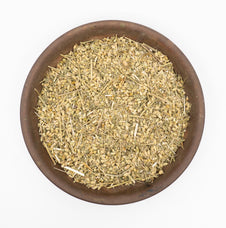
Yarrow
20 reviewsYarrow
20 reviews- In stock, ready to ship
- Inventory on the way
Yarrow (Achillea millefolium) is a beloved herbal staple with a rich history of use for wound care, fevers, digestion, and women’s health. Known as “soldier’s woundwort” and used since ancient times, its dried aerial parts are brewed into teas, infused for topical care, and used in seasonal blends. Earthy and aromatic, this resilient herb supports balance across multiple systems and is a favourite among herbalists for its versatility.
- Traditionally used to stop bleeding, reduce fevers, ease cramps, and support digestion
- Helps tone the uterus and blood vessels — used for heavy periods or postpartum healing
- Diaphoretic and astringent actions make it useful for colds, flu, and skin health
- Backed by clinical research for dysmenorrhea and neurological conditions like MS
- Excellent in first-aid, immune, sleep, or women’s wellness blends
Tea: Steep 1–2 tsp in hot water for 10–15 minutes. Blend with elderflower and peppermint for fever, or chamomile for cramps.
Tincture: Take 2–4 mL up to 3x/day for digestion, sleep, or circulatory support. Often combined with valerian, skullcap, or ginger.
Topical: Use cooled tea as a skin wash or compress. Rehydrated herb may be used as a poultice for minor wounds or bruises.
Bath or sitz soak: Add strong infusion to a warm bath for postpartum care, pelvic congestion, or menstrual comfort.
Culinary: Use small amounts to season soups, teas, or bitters blends. Adds aromatic bitterness like sage or bay.
Customers love yarrow for its ability to support women’s cycles, soothe inflammation, and aid in immune resilience. It’s also commonly used in “cold and flu tea,” sleepy blends, and DIY salves or oils for skin. Known as a boundary herb in both herbalism and folklore, yarrow’s toning, antimicrobial, and bitter properties are ideal for keeping systems in balance. Always strain well before use and store in a dry place.
Not for use in pregnancy or while on blood thinners. May cause photosensitivity or allergic reaction in daisy-sensitive individuals. Use in moderation and cycles. Not suitable for internal use in pets.
- Actions: Astringent, diaphoretic, bitter tonic, styptic, anti-inflammatory, vasodilator
- Systems: Circulatory, digestive, reproductive, integumentary, immune
- Energetics: Drying, cooling, slightly aromatic and bitter
- Pairings: Chamomile, elderflower, ginger, raspberry leaf, calendula, peppermint
- Clinical note: Use in small amounts, especially with sensitive digestion. Avoid long-term daily use unless guided. Not suitable for children or pets internally.
This information is for general reference only. Consult your practitioner before use if pregnant, breastfeeding, taking medication, or managing chronic illness. Not for internal use in animals unless directed by a vet herbalist.








